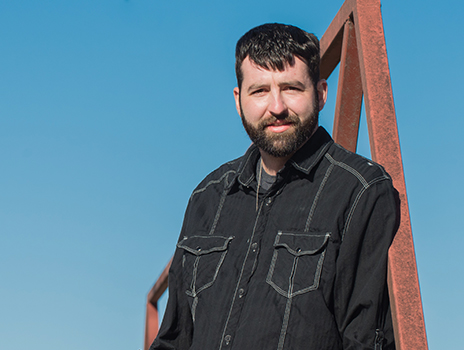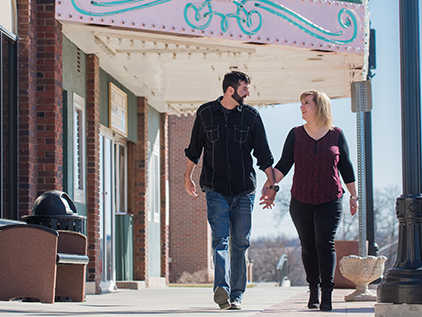Heart Transplant Provides Lifesaving Care


September 30, 2018
For Zach Engelken, life changed in a heartbeat. Just a year ago, the now 31-year-old Seneca, Kansas, man spent his days working construction. Such physical work suited the former college baseball player. Yet within a few weeks' time, he was fighting for his life and a new heart.
Health complications were not on Zach's radar. "I was a normal, healthy young guy," he says.
So when he came down with a bad cold in February 2016, Zach pushed through the symptoms and kept working. But his illness escalated quickly, leaving him weak and barely able to catch his breath. He was diagnosed with pneumonia at his local hospital, and his chest and abdominal pain grew so severe surgeons removed his gallbladder.
But the pain and symptoms intensified. Zach began coughing up blood, and his heart was in distress. That's when Zach's mother asked his physicians to send him to The University of Kansas Health System.

Although heart disease is the No. 1 killer of men and women in the United States, many people think they aren't at risk. Take our online heart health assessment to find out the state of your heart health.
Cardiologists diagnosed Zach with acute heart failure, with additional complications of liver, kidney and lung failure.
To say his condition was advanced would be an understatement. His ejection fraction (EF) score was 5%, which means that only 5% of the blood in his heart was being pumped out with each contraction. A normal, healthy EF is 50-70%.
"Zach was very close to death when he arrived at the hospital," says Zach's cardiologist at The University of Kansas Health System. "His heart was failing, and I feared he had just a few hours to live."
The cardiologist sat down with the family early on. They recall his clear but frightening message: Zach needed a new heart.
It was reassuring to have the expertise of an experienced heart failure team. The health system's heart failure specialists care for some of the sickest patients with the most complex heart issues. They provide a full range of care, including the most advanced treatment options for heart failure. For Zach, this meant a heart transplant would be possible. Our hospital is the only one in Kansas to offer heart transplant procedures and leading-edge interventions such as cardiac assist devices.
A transplant would take time. Cardiologists and cardiovascular surgeons developed a plan to stabilize Zach's condition until a heart transplant was available. To do this, surgeons implanted a left ventricular assist device (LVAD). This pump, powered by an external battery, pulls blood out of the heart's left ventricle into a mechanical pump, which then sends the blood back to the aorta for circulation. It helps the heart but does not take the place of this vital organ.
For Zach, it was a temporary fix.
"A VAD can be a bridge to transplant for many patients like Zach," his heart surgeon says. "For others, VAD assists a heart in healing or helps a patient's heart work better when the patient is not suitable for transplant."
I'm glad for the second chance at life, and I don't want to waste it. – Zach Engelken
Heart transplant patient
When surgeons discharged Zach from the hospital with his LVAD in April, he resumed a calm version of "normal." He was eligible for the transplant waiting list in November 2016. Just 2 months later, he received a life-changing phone call just after midnight – a heart was ready for him.
"It was an instant relief but a shock at the same time," says Zach. "I kind of asked myself if it was really happening."
After a nervous 2-hour drive from home, Zach and his fiancé arrived at the hospital. At around 11 a.m., Zach was being prepped for the biggest surgery of his life. He centered himself as much as possible.
The transplant surgery was a success. Zach's new heart started beating immediately after it was placed. He woke up the next morning and was moved from the intensive care unit to a regular patient room quickly, in 2½ days. He was discharged and able to return home just 9 days after transplant.
"Zach's case was as difficult as it gets," his surgeon says.

Zach does not take a single heartbeat for granted. As he heals, he is finalizing plans to marry the love of his life and start a new chapter.
"I'm glad for the second chance at life, and I don't want to waste it," he says.